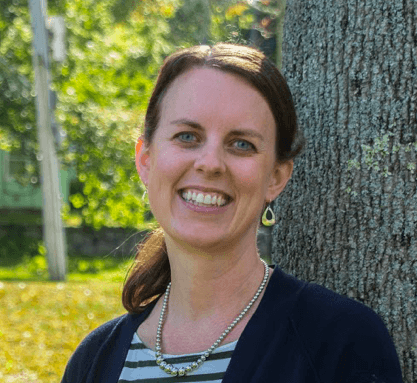Skye Leedahl has done extensive research in the last two decades about the senior citizen population. Photo by Autumn Walter.
Skye Leedahl has studied gerontological social integration since high school
Skye Leedahl, a faculty member at the University of Rhode Island, has worked for over 20 years on gerontology research about improving social integration of the growing senior population, which she was inspired to do ever since a high school research project.
“I started doing my research as a 16-year-old and I found out that our society was experiencing global aging,” Leedahl said. “Knowing that there weren’t a lot of people doing that kind of work at that time fueled my fire to work with older adults. I started to work at a nursing home when I was 16.”
Leedahl started to ask questions at the nursing home, which led to her pursuit of a doctorate degree in gerontology at the University of Kansas.
“Is there something else that we can do to make sure that the people who do need this extensive level of care are engaged?” she said.
Since graduation, Leedahl has focused her research on the social aspect of gerontology, which includes care, discrimination, how people live and social activities and integration.
She moved from Kansas to start at the University of Rhode Island in 2013 and has kept a similar research method with her.
“Most of the methods that I would use are in person surveys with older adults themselves or interviews with staff,” said Leedahl.
Over the past seven years, Leedahl has continued her research and teaches courses in human development and family studies, as well as political science.
“When I came here and became involved with college students, I got really interested in how can we connect college students to older adults to help better integrate them into the University community,” said Leedahl.
Several of her classes have a focus on bringing students and seniors together to create meaningful relationships.
“One example is where I have the students in the class partner up with an older community member to discuss technology and other issues, and they take surveys prior to and after this experience,” said Leedahl.
Kevin Whitaker, a senior psychology and philosophy student, became knowledgeable regarding the older population since attending Leedahl’s PSC/HDF 405 Policy Issues in Health and Aging course.
“They come to our class on Tuesdays and we have discourse with them over a variety of subjects including medicare, nursing homes and things like that,” said Whitaker.
Whitaker said they are given the opportunity to work with different senior citizens each time, which helps him get to know a variety of people.
“Each week we work with different seniors so I am constantly meeting different people every week,” said Whitaker.
Since taking on an internship from Leedahl known as “Cyber Seniors,” Whitaker has learned and made several connections, including one with an aging psychiatrist. This was all done while trying to bridge the gap between seniors and younger generations.
“I was actually able to have a good discourse with him about psychology, psychiatry and what can go on there,” said Whitaker. “I’ve actually got some networking opportunities from some of the people I have met.”
Leedahl is able to make these teaching opportunities possible often due to the Osher Lifelong Learning Institute (OLLI) which allows seniors to pursue classes of their interest.
Outside of the University, Leedahl has noticed the challenge of hearing loss and how it should be addressed to avoid social isolation. She has also addressed financial issues for senior citizens.
“Older adults are not a drain to their communities, and many people have been very responsible with their savings,” said Leedahl. “Communities need to make sure that they have the right supports and should know that becoming an age-friendly community is actually a very smart economical decision.”
As for the future, Leedahl wants to try new ways to integrate older adult students into URI.





